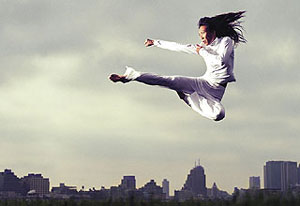武术,凝聚了中国文化艺术的精髓,深藏着中国传统哲学和道德观念。武术成为奥运会的正式比赛项目是每一个中国人期待多年的梦想。虽然申请道路困难重重,在北京承办08年奥运会之际,武术被列入北京奥组委的一项组织比赛,期待武术转正的梦想,也许指日可待。

Most visitors to China are deeply impressed by the tremendous popularity of wushu in this country. Going out early in the morning, they can see people doing this traditional form of exercise barehanded or with weapons in parks and on roadside open grounds. Marked by callisthenic beauty and rhythm and suggestive of real fighting, their movements follow set patterns that are designed more for health-building than for self defence.
Wushu, which literally means "martial arts" and is sometimes called "kungfu" abroad, may be traced back to pre-historical times when our ancestors had to fight against wild animals and among themselves for existence and subsistence. Wushu is a very important aspect that represents the spirit of Chinese culture and art. According to the philosophy of traditional Chinese medicine, wushu exercises consist of both "external" and "internal" work, the former meaning movements of the body, the hands and the feet and expressions of the eyes, and the latter being related to "the spirit, willpower, vital energy and strength." The two aspects are combined as movements are guided by consciousness so as to achieve "a unity of body and mind."
Wushu is very rich in form and content, encompassing hundreds of styles and thousands of routines, each with its own distinctive features. Changquang (Long-Range Shadow Boxing) is characterized by speed and vigour, while taijiquan is noted for its slow and gentle movements. One category of wushu forms is called xiangxingquan, which portrays the movements and postures of various animals, as exemplified by houquan (Monkey's Shadow boxing) and tanglangquan (Mantis' Shadow Boxing). Then there is the humorous zuiquan that describes a drunkard who is "drunk in appearance but not in mind" and is sober enough to outwit his opponent.
However, as wushu is becoming worldwide popular, It's a common wish of all Chinese people to watch kung fu competitions at the Beijing Olympic Games. In 2008 Olympic games, wushu is not an official event nor performing event, but wushu is allowed to hold a international competition under Olympic Organizing Committee's permission.